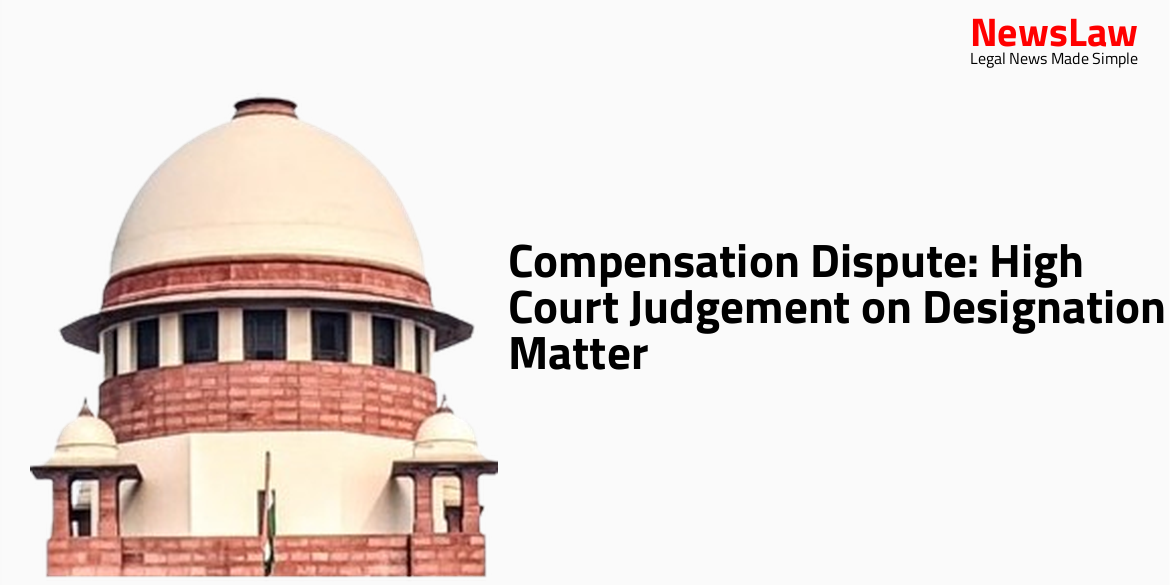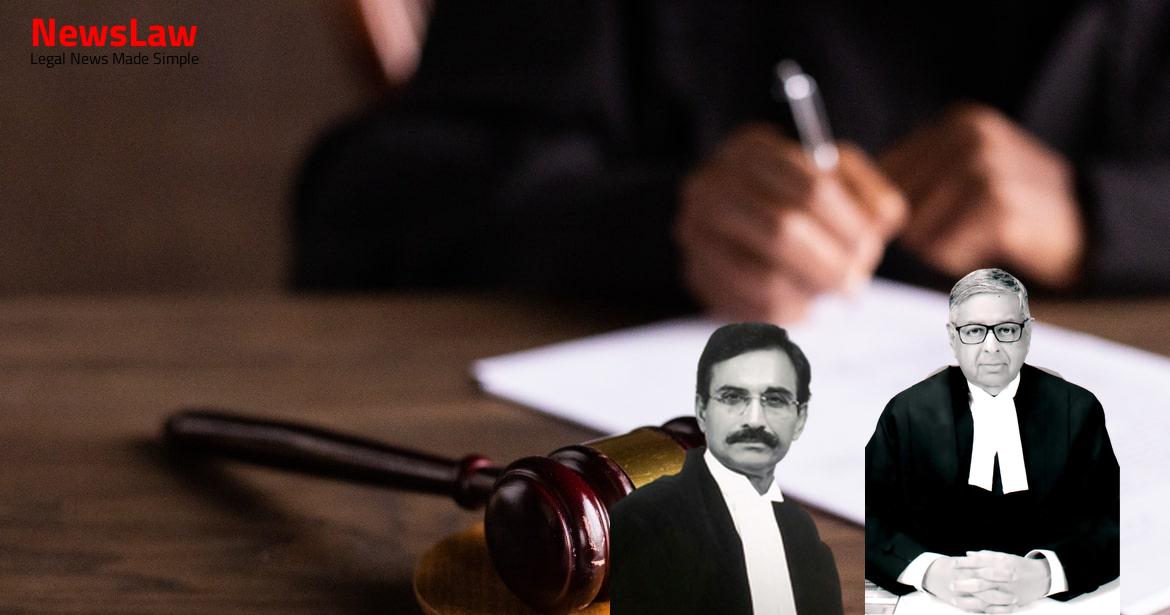In a recent High Court judgment, a significant decision was made regarding a compensation dispute related to the designation matter. This case involved a dispute between the management and a workman regarding retrenchment compensation and designation. Stayed awards and previous rulings were considered in the judgment. Dive into the details of the High Court’s decision and its impact on the involved parties.
Facts
- The respondent workman failed to raise any objection regarding the designation of ‘unskilled’ worker and salary while in service.
- The workman consistently received salary prescribed for unskilled work and did not challenge it.
- The judgments cited by the Labour Court were irrelevant to the current case.
- The fact that the Union did not push for the implementation of the impugned award suggests lack of urgency.
- No new issues can be raised in the writ jurisdiction which were not raised before the Industrial Tribunal/Labour Court.
- The High Court of Delhi stayed the operation of the order issued by POIT on 29.09.2009 granting designations to skilled and semi-skilled workers.
- Sections 9A and 25-N of the Act were deemed not applicable in this case by the Labour Court.
- The claimant did not work with the management from the date of transfer till the date of rejoining, hence Section 25-F applies for retrenchment compensation.
- The order of POIT declaring the transfer of 20 workers illegal was stayed by the Hon’ble High Court of Delhi in 2006.
- The Labour Court awarded the respondent workman a compensation of Rs.200,000/- to be paid by the management within one month with 9% interest per annum till payment.
- The Labour Court determined that the workman is entitled to wages of the skilled/semi-skilled category which were not paid by the management.
Issue
- Issue: Whether the stayed award of the Industrial Tribunal could be relied upon by the learned Labour Court to hold the respondent entitled to compensation.
- The Workman concerned was receiving the salary of ‘unskilled’ labor from the date of appointment until the time of retrenchment.
- The central question for the Court is whether the impugned award by the Labour Court warrants interference under Article 226 of the Constitution of India.
Arguments
- The petitioner’s counsel argued that the impugned award is erroneous as it was passed without considering all the facts and circumstances of the case.
- It was pointed out that the workman was willing to work but was kept away from his job without any valid reason.
- The counsel emphasized that the 16 years of service by the workman should be taken into account for computing retrenchment compensation and other benefits.
- If there was any amount due to the worker related to the designation matter dispute, it could be paid in case the management changes.
- Claimant filed a case against his transfer which was held by POIT that he was doing an unskilled job.
- The award resulting from the case was not challenged by the claimant before any forum, making it final and operating as res-judicata.
- Ld. ARM argued that granting designation to the claimant has been stayed by correctly calculating retrenchment compensation and notice pay based on their last drawn wages rather than the award dated 29.09.2009.
Analysis
- Management was wrong in not calculating notice pay and retrenchment compensation as per the 2009 award
- POIT held the transfer illegal
- High Court stayed the designation matter award in 2013
- The workman was entitled to compensation based on the designation from the 2009 award
- The retrenchment compensation paid was inadequate violating Section 25-F of the I.D. Act, 1947
- Management produced attendance records as evidence
- The workman did not prove that junior employees were retained by the management
- The learned Labour Court correctly passed the award for compensation
- The workman’s service was terminated without being paid his dues as per the designation
- The designation matter stayed in 2013 did not affect the workman’s retrenchment compensation
- The workman had joined as unskilled labor but was deemed skilled/semi-skilled by the Industrial Tribunal in 2009
- No evidence contradicted the seniority list provided by the management
- The workman had rendered continuous service for over 20 years and was entitled to claim retrenchment compensation
- The management failed to show any error or arbitrariness by the Labour Court
- The Labour Court rightly awarded compensation based on the designation despite the stay of the 2009 award
- The Court observed that a suspension holds an issue in abeyance during the pendency of a writ petition.
- The principle of restitution entitles the successful party in litigation to be restored to the position they would have been in if not for the stay.
- Various cases were cited to support the principle that parties must be restored to their original positions after the dismissal of a writ petition or the modification of a stay order.
- The Court highlighted the duty of the Court to restore parties to their original positions after the dismissal of a writ petition or modification of stay orders.
- The principle of restitution ensures that financial benefits do not result from unwarranted litigation, and the successful party is not prejudiced.
- Previous judgments were referenced to indicate that quashing or dismissal of a writ petition should not absolve the losing party from their obligations as per the interim stay.
- The legal maxim actus curiae neminem gravabit was applied, meaning that an act of the Court shall prejudice no man in cases of financial difficulty leading to closures.
- The duty of the Court to restore parties to their pre-litigation positions was emphasized in cases of genuine reason for management closures as well.
- Distinction between quashing and suspension of law was made, where repeal removes the law entirely while suspension allows for operation in other respects.
- The distinction between quashing and suspension of law was elaborated with examples from previous judgments.
- The importance of restitution and restoring original positions post-litigation was emphasized throughout the analysis of various legal precedents.
- Sub-section (b) of Section 25-F requires the employer to pay compensation equivalent to fifteen days average pay for every completed year of continuous service or any part thereof in excess of six months upon retrenchment.
- Sub-section (c) of Section 25-F mandates that the employer must provide notice to the appropriate government to have a valid claim for compensation, and the workman must have been in continuous service for at least one year with the employer.
- In the case of L. Robert D’Souza v. Executive Engineer, S. Rly., the Supreme Court emphasized the importance of continuous service for the validity of a claim under Section 25-F.
- Section 25-F of the Act sets the conditions precedent to the retrenchment of a workman, including the requirement of one month’s notice in writing or payment of wages in lieu of notice.
- The Labour Court found that the petitioner management had illegally retrenched the workmen as they were not compensated as per their designation.
- Similar findings were given in previous cases related to the matter.
- The petitioner management failed to present any compelling arguments in their favor.
- This Court agrees with the Labour Court’s findings and sees no merit in the batch of petitions.
Decision
- The issue before the learned Labour Court was twofold: legality and justification of the workman’s retrenchment.
- Management directed to pay compensation to the respective workmen within three months.
- Specifically, the management must pay Rs.2,00,000/- to the workman within one month or face 9% interest per annum.
- Parties to bear their own costs.
- Award passed as per the directions.
- Copies to be sent for publication, and file to be consigned to the record room.
Case Title: SAWHNEY RUBBER INDUSTRIES Vs. JAWAHAR PRASAD (2024:DHC:4569)
Case Number: W.P.(C)-4773/2019



